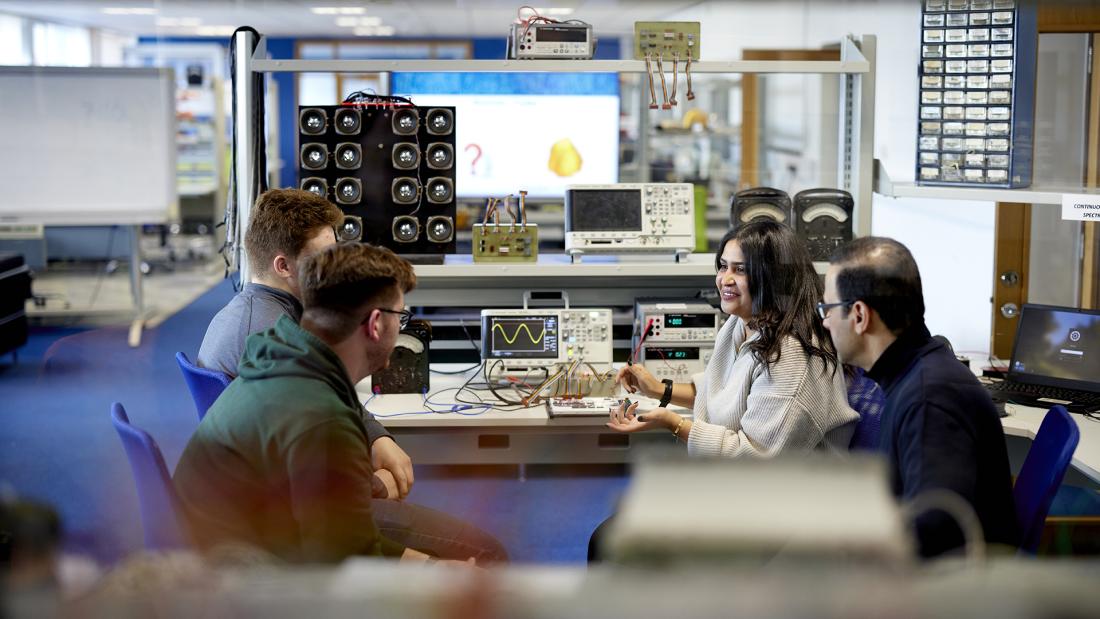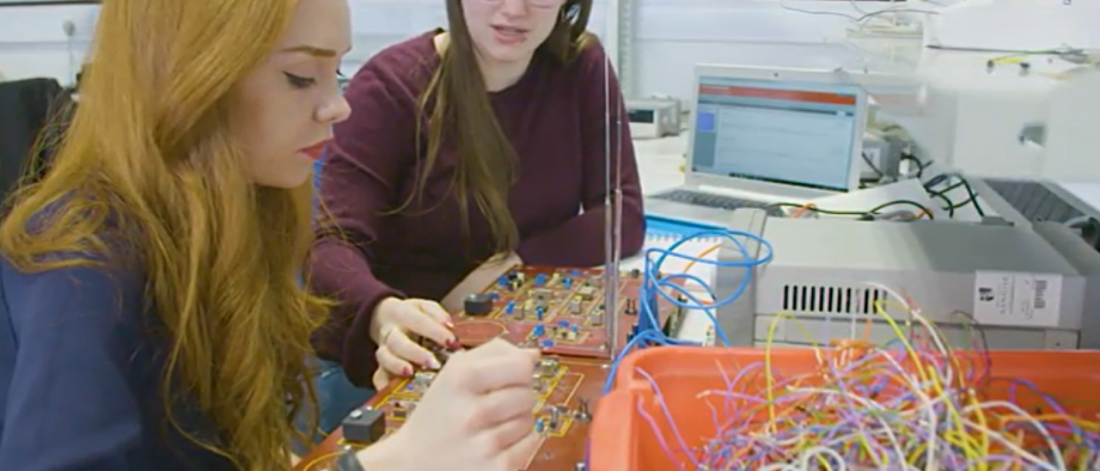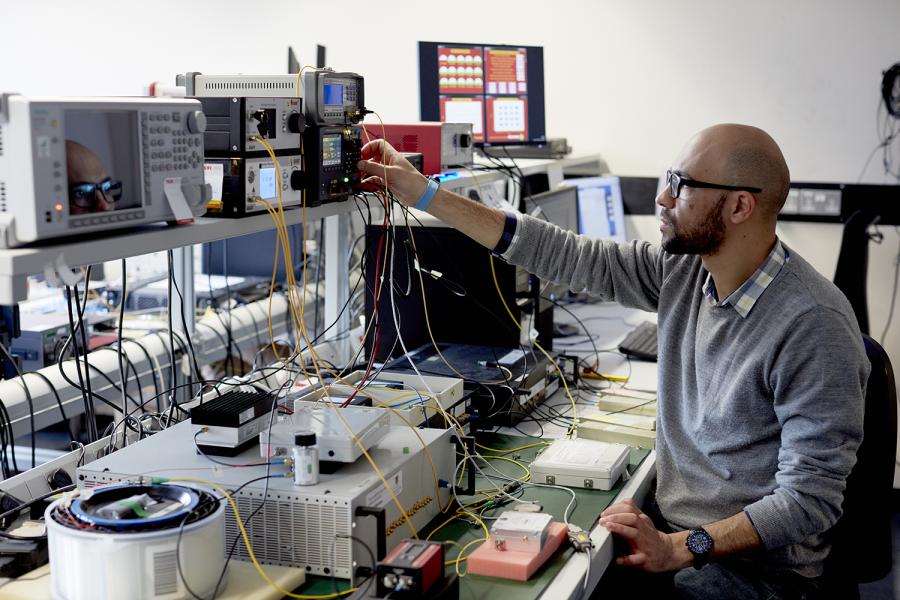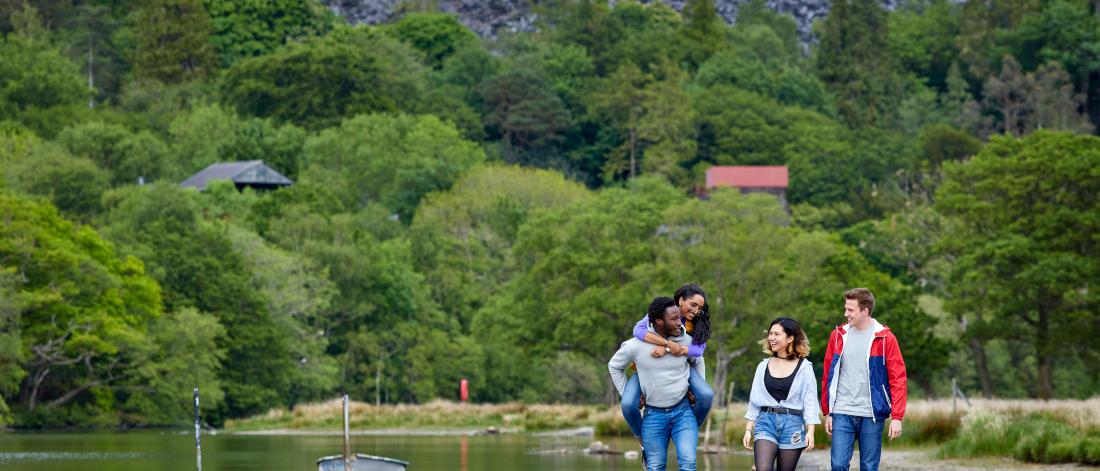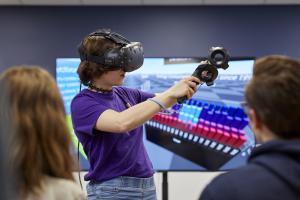Find the right Engineering course for you
Our facilities will bring what you learn on your degree to life
As a student here, you will benefit from the latest facilities including:
- Keysight certified undergraduate teaching lab
- Class 1000 Clean Room. Undergraduate students attend a tour in the first year and will work in the Clean Room during the Year 3 project if working with a relevant academic.
- Our Digital Signal Processing (DSP) Centre, specialising in 5G technologies, exposes our students to cutting-edge technologies and research in Digital Signal Processing. Our ambitions centre around employing micro and nanotechnology to exploit new materials and techniques.
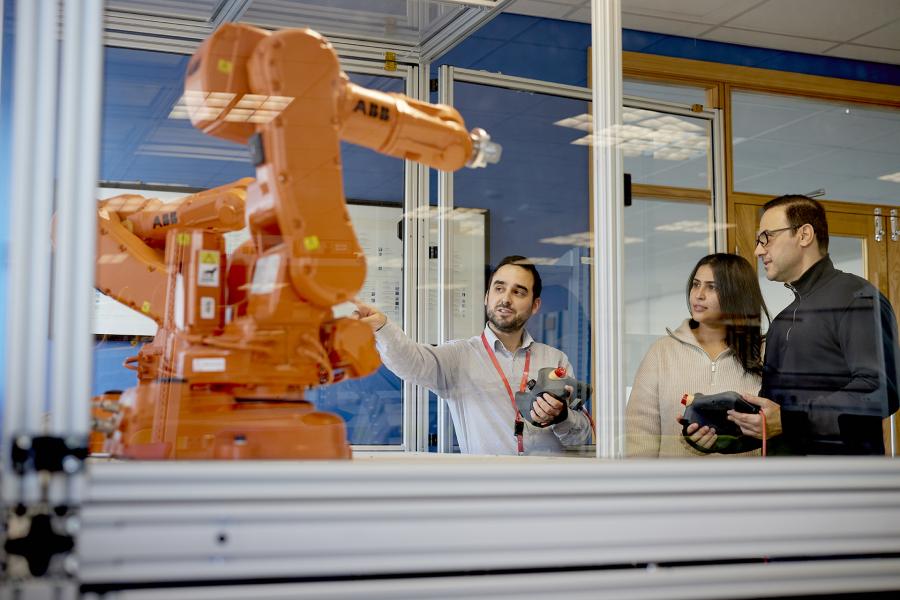
Watch - Study Electronic Engineering
Abigail talks about her course, accredited by the Institute of Engineering and Technology, facilities and future career options.
In this video, Abigail talks about her experiences at Bangor studying an undergraduate Engineering degree.
[Music]
Electronic Engineering at Bangor University in the first year covers basic elements of the subject area so you do mathematics, programming fundamentals, laboratory experiments and circuit theory and design. Then in your second year it's just a build up upon what you've done already with a bit of a business element and then in your third year it's kind of you integrate all that you've learned into your individual project.
What I love most about electronic engineering is the amount of opportunities that will be available to me when I finish the degree. The ere is an unlimited amount of industries that I can go into - aerospace, telecommunications, research or even automotive electronics. The degree is accredited by the institution of Engineering and Technology which means that we get to a very high standard and also because of this we get a free membership for the institution for the duration of our course and also after we finish we'll still be members so though we have the right to become or start on the path of becoming eventually a chartered engineer.
[Music]
I decided to study at Bangor University because of the staff to student ratio so you get to know everybody on an individual basis which makes the learning experience a lot more personal and you actually feel like an individual not just a student number to a lecturer. Being taught by lecturers that are research active - it's very inspiring but it's pretty amazing because they teach you this like first-hand the research that they discover and it's it's really impressive work and it does inspire you makes you more ambitious. At Bangor University in the Electronic Engineering School we have access to many facilities such as well-equipped laboratories with a lecture room attached to it, computer rooms with networked computers and industrial software and we've also got state of the art class one thousand clean rooms so it's quite amazing being able to see where you know where the magic kind of happens and starts.
When I'm not studying up on university I like to go on many adventures such as hiking, climbing up mountains such as Snowdon, just pretty much taking advantage of the landscape and the area that Bangor is situated in. Also, there are over a hundred and fifty clubs and societies here at Bangor University which are all free to join which is incredible for our students and also it's just such a great opportunity to try new things also to make lots of new friends.
Bangor University has amazing links with industries and between the second and third year we get the opportunity to have a year in industry which is amazing players we've experienced get to apply all practical knowledge to actual practices and we therefore become more attractive to future employers. The advice I would give to somebody considering studying here at Bangor University is don't think twice about enrolling here. It's such an incredible university, the quality of teaching reflects this and the friends that you'll make and how happy the students are here it's you know just a true reflection how amazing your university experience will be here at Bangor University. [Music]
Watch - Jasmine Parkes, Engineering
Masters student Jasmine, talks about her experience as an undergraduate Engineering students at Bangor University.
In this video, Masters student, Jasmine Parkes tells us about her experience as an undergraduate student studying Engineering at Bangor.
"I'm Jasmine, I'm a Masters student doing fibre optic sensing.
The sensing part is trying to sense if someone is tapping into the fibre.
So if an eavesdropper is trying to eavesdrop on the data that you're trying to send, I'm trying to locate that.
What I love about engineering is you could do just about anything.
You could enter any field and you kind of just turn your imagination into reality.
I think that's amazing. I'm local, so it was great having a really good engineering course at my doorstep.
When I went into A-levels I was panicking about, oh, what do I do? I just knew that I loved maths.
So when my dad, who had an electronic engineering background, he was looking...He was like - you'll love electronic engineering, and I do, so it's brilliant.
Bangor University has got a really good, undergraduate internship scheme, so I was able to do a Technocamps internship, which is going to primary schools, secondary schools, trying to encourage people to go into STEM through different activities.
In my third year I did internship with DSP Centre which led to me getting a funded Masters, which was brilliant. And then hopefully, it'll lead to me getting a PhD, which would be great."
Watch - Tessa Davey, Engineering
Tessa Davey talks about what inspired an interest in Nuclear Engineering at Bangor University.
My name is Tess Davey. I'm a UK reader in nuclear materials at the Nuclear Futures Institute, which basically is part of generating clean energy towards a net zero carbon future.
I have a really great opportunity to work with a really diverse group of people from all over the world on developing new technologies and new materials for both fission and fusion, um, to potentially be realised in the future. I was inspired to work in nuclear engineering, particularly because I think it's a very important field in terms of sort of climate change and things like that.
We need to look to cleaner energy sources in order to kind of progress as a society. Nuclear energy is one way to do that. For me in particular, it's very meaningful to develop new technologies or contribute to the development of technologies that will help us have cleaner energy in the future.
I've been really lucky to have many very strong mentors at all stages of my career. When I was working, um, at Torque University in Japan, I was working with a very inspirational woman who really helped me navigate being a woman in academia, particularly in very different environments, and that was really inspirational, being a very good mentor in terms of academics, she taught me a lot about how to navigate this field as a woman.
I've also been very lucky at other stages of my career to have some very supportive mentors who supported me and given me lots of opportunities, um, without which I certainly wouldn't have been able to achieve so much in my career so far.
Watch - Computer Science and Engineering EXPO 2025
Welcome to the 2025 Computer Science and Engineering Expo.
I love the expo. It's that time of year. We can see the lights at the end of the tunnel.
This is a showcase of what students have been working on for their final year projects, so we can actually see the results in public.
They can show their friends, show colleagues, show academics, and also show businesses.
There's also businesses here today giving short talks, and often they will have jobs available.
Or they might want to interview a few of the students.
And there's no better way of making a first impression than the poster showing probably the biggest project they've worked on so far.
My name is Pranav Rookie SPG. I'm a third year Electronic Engineering student here at Bangor.
my project is on making biodegradable electronics, specifically our tree cellulose.
So at the moment most of the electronics that we have goes well until the end of life cycles made out of petroleum based things.
It's really toxic to the environment. So this essentially out there, the end of life cycle can go and be turned into compost.
So the whole thing is biodegradable. When you make electronics, your body produces like 100,000 skin cells every second.
So even one of those can contaminate a sample. So I work in a clean room, which basically covers my whole body.
So I have to work in a room where 81,000 particles exist any second.
We've got some companies here today. There's talks going on throughout the day as well.
Some of the students have got some CVS with them,
so it's an opportunity for them to see not just what's out there but what's out there locally as well.
So all the companies that with us today are local. My name is Brad Newman and I work for the TV and aerial filming specialist company Aerial Works,
where we specialise in aerial footage for television and film, and we also do R&D as well.
So we wanted to see what the latest and greatest minds coming out of Bangor University are.
And what they could potentially offer us in terms of the R&D side of things.
Plus it also gives them a little bit of an insight into seeing what sort of industries that are to offer,
you know, not just the stereotypical sort of industries. There's always people looking for stuff in the drone world as well.
My project is exploring VR interaction for history education.
So basically you're set in the Roman times.
and you've got a table in front of you with artefacts where the player picks them up and interacts with them.
The support from the lecturers is really good. Um, they have an open door policy where you can go in and ask them anything.
So they've worked with me very well. with the community.
It's just a lovely place to be here. Over the last three years I've had a variety of different modules.
I've had app focussed modules, UI focussed modules, game focussed modules,
and I wanted to combine them into one final project which was creating a UI that people could use to track their progress.
and all my lectures that I've had have also helped me.
I've spoken to them individually about the projects as well, so I've had a lot of help from them.
Can you tell me why this expo is such a good opportunity for students like yourself?
Yeah. Well, first of all, hence the name, um, Expo is a good way to expose my products to other people.
Also, it's a good opportunity to see other people what they'd be working on at.
It's it's great just to come together, isn't it, to share everything really.
Well, that's the end of 2025 Expo for Computer Science.
I've really enjoyed looking around today, seeing what the students should be doing, and good luck to everybody in the future.
Do you have a question about life as a Bangor University student? Our ambassadors will be happy to help you find the answer.
They can tell you more about studying here, about the amazing Clubs and Societies we have, and how they made friends and settled in to life at university.
If you have any questions about the course, our lecturers are on hand to help. Below are some examples of frequently asked questions. Can you think of any more?
- What are the qualities of a successful student in this subject at Bangor?
- How can I prepare myself to study this subject at Bangor?
- How will I know that this subject at Bangor is the right choice for me?
Our Research in Engineering
In the 2021 Research Excellence Framework (REF), 50% of our research impact was rated as world-leading and 87% of our research outputs rated as world-leading or internationally excellent. Our globally renowned research groups include the Digital Signal Processing Centre and the Nuclear Futures Institute.
Our research activities are organised in three research groups, which can overlap to maximise synergies and resources: Photonics & Communications, Energy Environmental and Bio - Sensing (EEBG), Visualization, Data, Modelling & Graphics (VDMG).
You may also be interested in these related subject areas.
You may also be interested in these related subject areas.

